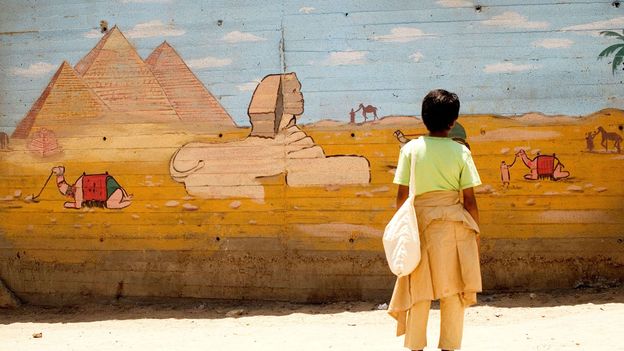
Yet Tunisian filmmakers have managed to develop their industry by introducing new genres, technologies and ideas. Two excellent examples of the invention and innovation in the country’s cinema are Abdelhamid Bouchnak’s Dachra (2018) and Ala Eddine Slim’s Tlamess (2019). Dachra is the country’s first horror film and has ushered in an upcoming wave of genre filmmaking in the country, using horror tropes to criticize the dominance of religion and show a new means of expression for filmmakers to bypass censorship. Meanwhile, Tlamess uses a very distinctive form of surrealism and touches on militarism, attributing gender roles and existential boredom, while giving Arab cinema its very first scene of frontal nudity.
Elsewhere, in Yemen, Libya and Syria, the main focus of film making was on portraying the deteriorating conditions in these countries, as evidenced by several documentaries by filmmakers now living in exile, such as London-based Libyan director Naziha Arebi’s Freedom Fields (2018); Copenhagen-based Syrian director Feras Fayyad’s The Cave (2019); fellow Syrian Waad Al-Kateab’s co-directed For Sama, documenting her way out of her war-torn homeland; and Los Angeles-based Sufian Abulohom’s Yemen: The Silent War (2018).
The future of Arab cinema
A decade later, the revolutionary energy of the Arab Spring is still there, both in life and on the big screen. The popular uprisings in Algeria and Lebanon in 2019 and 2020 have produced images that contain stories similar to those of the early Arab Spring films – from Karim Aïnouz’s colorful portrait of Algerian revolutionary youth, Nardjes A. (2020), to Several Lebanese projects in the pipeline that can now be demolished after the explosion in Beirut last summer dented hopes of a happy ending for protesters.
Meanwhile, a revolution took place in Sudan nine years after the start of the first wave of the Arab Spring, which has also led to the rise of cinema in the country. As Sudanese filmmakers reflect on events, their films show that they have learned the valuable lesson that revolutions can fail at any moment and that the road to democracy is long and difficult. Two 2019 documentaries capture the essence of a country on the verge of change, but cast doubt on the tangible possibility of a comprehensive institutional overhaul. In Suhaib Gasmelbari’s Talking About Trees, a group of veteran filmmakers attempt to revive an old cinema outside of Khartoum, but are faced with a stifling red tape that is not expected to disappear in the near future. The same repressive rules are being imposed by a group of female athletes aiming to assemble the country’s first female soccer team in Marwa Zein’s offside in Khartoum, highlighting that the country’s predominant patriarchy will continue to challenge reform efforts.
As for the original uprisings? The legacy and aftermath of the Arab Spring continues to haunt film in the region, and yet a full account of what happened in 2010 and the years since has yet to be told. Most popular hits about the uprisings – Jehane Noujaim’s The Square (2013) from Egypt; the aforementioned Beauty and the Dogs from Tunisia; the countless Syrian documentaries – provide straightforward, digestible stories to a largely Western audience unaware of the nuances and complexities of the region and its history. And since almost all independent Arab films depend on European capital for funding, productions are usually shaped by what the West expects from the Arab world, and are ultimately judged by Western critics with little to no knowledge of the region.
The rise of Sudanese cinema and the remarkable evolution of Tunisian films will ensure that the spirit of the Arab Spring lingers on the big screen. The real story of the rise and fall of the Arab uprisings, on the other hand, is still waiting to be told.
Do you like film and TV? Join BBC Culture Film and TV Club on Facebook, a community for cinephiles around the world.
If you want to say something about this story or anything else you’ve seen on BBC Culture, check out our Facebook page or send us a message Twitter.
And if you liked this story sign up for the weekly bbc.com features newsletter, called The Essential List. A hand-picked selection of stories from BBC Future, Culture, Worklife and Travel, delivered to your inbox every Friday.